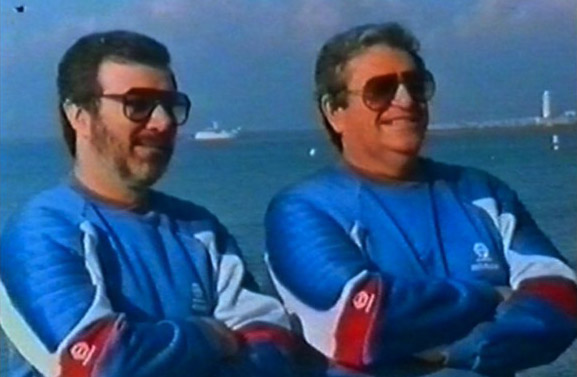
Josh Reviews Electric Boogaloo: The Wild, Untold Story of Cannon Films!
Towards the end of Mark Hartley’s spectacular documentary Electric Boogaloo: The Wild, Untold Story of Cannon Films, Richard Kraft sums up the entire story of the company: “Cannon’s legacy will be the insane stories of how that many movies got made, during a very specific period of time, by two guys who had no business doing any of it.”
The name Cannon Films strikes a huge nostalgic chord in me from my childhood years in the eighties. It’s not an entirely favorable recollection, as I most know Cannon for its involvement in the dismal Superman IV: The Quest for Peace. That Superman film was one of the first times as a kid that I started to discern that not all movies were created equal. It was clear to me right away that something was “off” about Superman IV, that the sequel wasn’t as great as the previous Superman films that I loved so much. (As a kid I detected the flaws in Superman IV even before I started to question Superman III.) I started to wonder why that mighty have been, and after doing some reading about the film in magazines, in the days/months after the film’s release, it became clear that the new producers of the series, Cannon, had tried to make the film on the cheap and the results showed on screen.
Nevertheless, I have always held a warm spot in my heart for the cheesy low-budget craziness of Cannon films. And so I was hugely excited when I first heard of Mark Hartley’s documentary.
Electric Boogaloo: The Wild, Untold Story of Cannon Films does not disappoint. The film is a spectacularly thorough, and tremendously entertaining, look back at the Cannon Group.
The Cannon story centers on the two men who ran the company from 1979 until 1989: Israeli cousins Menachem Golan and Yoram Globus. These two men, particularly Menachem, were big personalities and quite idiosyncratic in the world of Hollywood. Everyone interviewed for the film — and the film boasts an enormously impressive array of interview subjects — seems to have a story about Menachem. And almost everyone in the film seems to relish showing off their personal imitation of Menachem — his distinct Israeli accent and his brash personality. The film is stuffed to overflowing with outlandish, hard-to-believe stories of Menachem and of the crazy, seat-of-the-pants way in which the Cannon Group operated.
Many of the subjects interviewed for the film seem to have liked Menachem and Yoram, and many strongly disliked them. It is hard to argue that Cannon succeeded in making many movies that were any good. But what I enjoyed about the documentary is that Mark Hartley clearly has an affection for Cannon and the mostly-terrible movies they made. I have the same affection, as do I suppose many people who grew up in the eighties watching these low-budget Cannon movies. That affection comes through loud-and-clear in the film. Mr. Hartley’s film does not shy away from giving voice to those who have critical things to say about Menachem/Yoram and Cannon, but it never turns into a negative attack job. The film is mostly a fond look back at this crazy era of movie-making and the brief-but-loud life of this independent movie-making studio.
Cannon’s model was, for the most-part, making low-budget B-movies with a star and an exciting title and/or poster that they could sell overseas to make money. Cannon was responsible for many action-flicks starring Chuck Norris and Charles Bronson, and later Sylvester Stallone and Jean-Claude Van Damme. The studio often sold their movies before they were even made! The sale gave them the money to go and make the movie. This documentary is filled with stories of how Menachem and Yoram would often sell a movie based only on a title and poster, with no actual idea at all of what the movie would be about! That’s a crazy way to make movies, and it’s not a terrible surprise that most of the movies that resulted from that backwards process didn’t wind up being that good. Eventually, Cannon’s size grew as did the ambitions of Menachem and Yoram, who wanted to challenge the Hollywood studios. This led to Cannon’s taking greater risks on more well-known properties, such as the aforementioned Superman IV and Masters of the Universe. But these movies failed, mostly because they were made on the cheap. The failure of those big films eventually led to Cannon’s undoing.
There are so many incredible stories in this film. I wouldn’t dream of spoiling them. Let me just say that the documentary is huge amounts of fun, filled with robust clips from Cannon’s many terrible movies. Be prepared to see a lot of gratuitous nudity, over-the-top violence, and cheesy special-effects! All of the many people interviewed for the film are game, sharing story after great story about the crazy days of Cannon.
For anyone who grew up watching these Cannon films, and for anyone who enjoys a behind-the-scenes look at movie-making, this documentary is definitely for you. I loved it.

